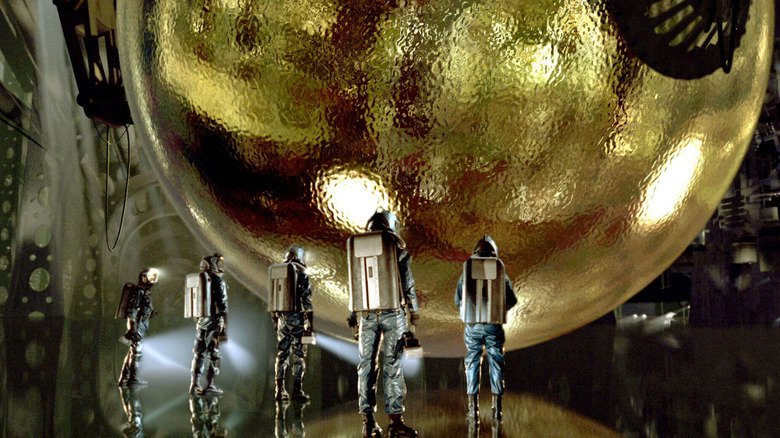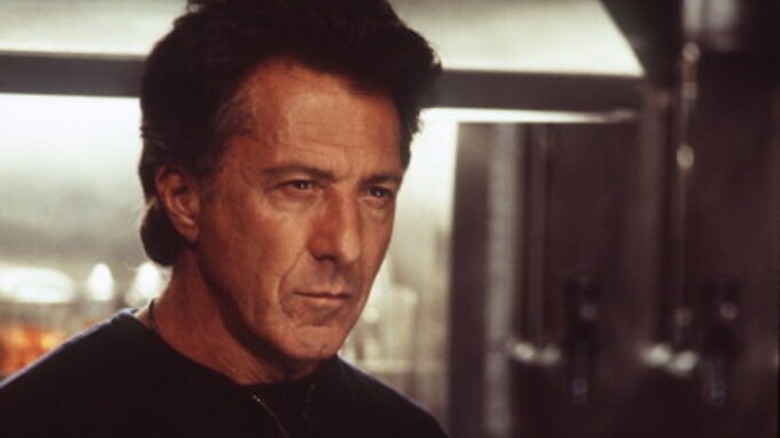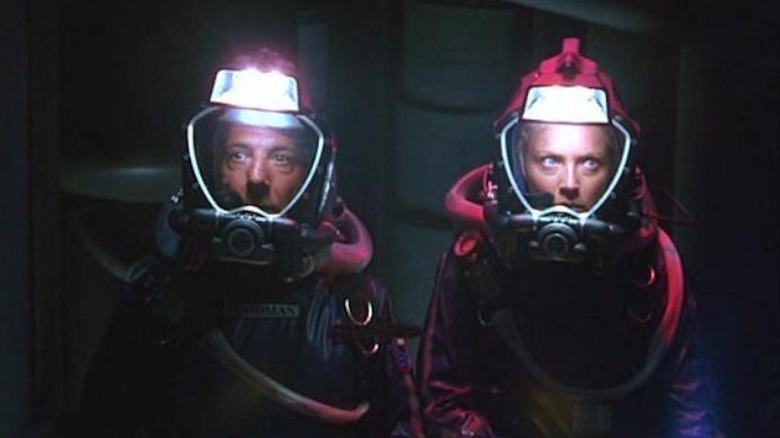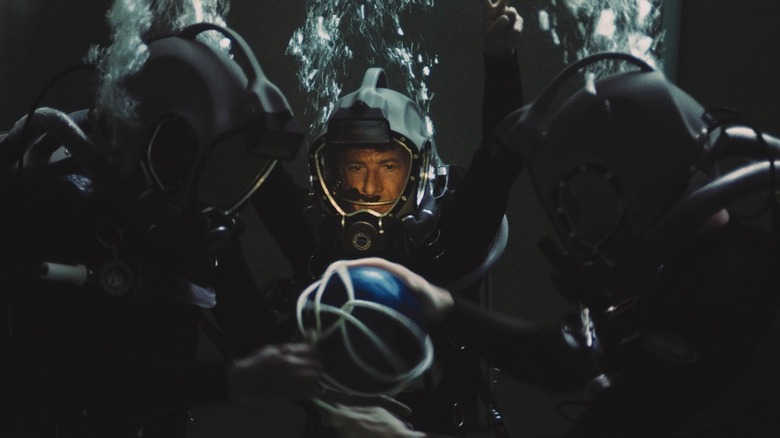Sphere, The Michael Crichton Movie That Tried And Failed To Ride The Jurassic Park Wave
Hollywood hates risk. So when studios hit on a winning formula, they pounce on it like starving dogs. People can't get enough of a massive great white shark dining on vacationers? Give 'em more sharks, or substitute that giant shark with a hulking bear, alligator, or ravenous swarm of piranha.
The industry gets especially amped when they discover a bestselling author whose work translates well to movies. After Brian De Palma scored a box office triumph with Stephen King's "Carrie," every novel the new master of horror knocked out spurred a bidding war. Adapting King was no guarantee of quality, but his name on the poster was generally sufficient to pack theaters with scare-happy moviegoers. Though a glut of uninspired King riffs eventually cheapened his brand as a marketing tool, his books were still valuable IP provided you took care with the material.
Michael Crichton wasn't quite in King's class during his first run of bestsellers in the 1970s with "The Andromeda Strain," "The Terminal Man," and "The Great Train Robbery," but unlike the Maine-bound author, he cozied up to Hollywood. Crichton made his directorial debut with "Westworld" in 1973, and spent the next 16 years establishing himself as a capable suspense filmmaker (his 1981 bomb "Looker" looks fairly prescient four decades later).
The publication of "Jurassic Park" in 1990 changed everything for Crichton. The brainy med school dropout had finally hit the commercial bullseye by conjuring a scientifically plausible tale of dinosaurs returning to Earth. When Steven Spielberg's adaptation broke box office records and redefined blockbuster cinema, the studios viewed Crichton as the surest of things. Suddenly, his bibliography, particularly his techno-thrillers, was hot stuff. Between 1993 and 1999, six films based on Crichton's novels would get greenlit. Most were hits. Barry Levinson's "Sphere" was not.
Crichton goes deep and comes up with a shallow sci-fi yarn
"Sphere" is a marginally entertaining read. It's a clod's version of Stanislaw Lem's "Solaris" featuring a group of scientists who are dropped to the floor of the Pacific Ocean to examine a recently discovered spacecraft. Inside the craft is an orb that evidently causes those who come in contact with it to manifest fears from their subconscious in potentially fatal ways. One of these fears is the giant squid from Jules Verne's "Twenty Thousand Leagues Under the Sea," which is probably the element of the book that hastened its adaptation.
Prior to "Sphere," Levinson was renowned for his human dramas. "Good Morning, Vietnam," "Rain Man," and his Baltimore trilogy of "Diner," "Tin Men," and "Avalon" placed him in the upper echelon of Hollywood's filmmaking hierarchy. As for his record as a director of fantasies, "Young Sherlock Holmes" and "Toys" were critical and commercial misfires.
"Sphere" was closer to Levinson's wheelhouse in that it had a spark of a smart idea and relied heavily on characterization. The latter quality meant Levinson could deploy his strengths as an actor's director, which no doubt appealed to the agents of Hollywood's biggest stars. A cerebral Levinson sci-fi with Crichton's post-"Jurassic Park" pedigree sounded like a safe bet. So Levinson brought his Oscar-winning "Rain Man" star Dustin Hoffman together with former Oscar nominees Sharon Stone and Samuel L. Jackson for a project that screamed "can't miss" on paper.
Also integral was Levinson's hit adaptation of Crichton's lizard-brained "Disclosure," in which Michael Douglas is sexually harassed by Demi Moore's predatory tech CEO. Levinson sanded down the book's misogynist edges with "Quiz Show" screenwriter Paul Attansio, but it remains an irredeemably silly thriller. Still, it made bank. The conventional wisdom was that Levinson could kinda-sorta elevate Crichton. "Sphere" looked like a winner.
An $80 million albatross
Principal photography on "Sphere" was supposed to start in late 1996, but Warner Bros. was alarmed by the scale of the screenplay. Levinson was preparing to make a much more expensive movie than the studio had anticipated. The production start date was delayed until spring of 1997, which allowed Levinson to slap together a 30-day shoot for a political satire called "Wag the Dog." This turned out to be the one good thing that came out of "Sphere."
WB envisioned "Sphere" as its big December 1997 movie, so when they bumped the release date to February 1998, leaving them with nothing but Kevin Costner's "The Postman" over one of the most lucrative box office frames of the year, "Sphere" looked like a dud.
This is typically when I get excited. I love big-budget mutts. When a massive production flies off the rails, you might get a "Hudson Hawk" or a "Wilder Napalm" — mainstream projects that were always niche efforts to begin with. "Sphere" isn't a mutt. It's a Brundleflied would-be blockbuster. (If you're thinking of Eric Stoltz's dog from "The Fly II," don't. That good boy deserves better, and it's only going to make you sad.) And it's aged horribly.
The flop from 20,000 fathoms
I watched "Sphere" for the first time since its theatrical release for this piece, and I think I made a pledge similar to the trio's decision at the end of the movie to forget it entirely. Aside from the movie's most egregiously mean sequence (Queen Latifah being stung to death by jellyfish), it was an entirely new experience for me.
First, let's address Latifah's death. Why is she in this movie? At the time of its production, she was one of the most respected rappers in the industry, a sitcom star, and had just given an Oscar-worthy performance in "Set It Off." You don't kill the Queen with jellyfish!
"Sphere" should've been scrubbed while Levinson was off making "Wag the Dog." When your pitch for an $80 million sci-fi flick is "'Solaris' meets 'The Abyss,' but catastrophically stupid," you thank god you had a three-month opportunity to kill it. When your rewritten screenplay breaks the movie down into anticlimactic, momentum-stifling chapter breaks, you wonder how two scribes capable of classics like "Diner" and "Quiz Show" could err so horrendously.
I'm not the biggest fan of Paul W.S. Anderson's "Event Horizon," but, in theory, that's how you work a commercial variation on "Solaris." Levinson and Attansio treat Crichton's dopey novel as a work imbued with intellectual integrity, and, in doing so, knocked out "Alien" without the alien. Crichton wrote pseudo-brainy beach reads. "Sphere," which was published three years before "Jurassic Park," was not that, and initially ignored by studios for a reason. Unless you're in need of a soporific, leave "Sphere" to decompose at the bottom of the sea.



